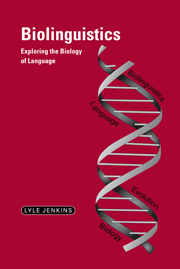3 - Acquisition (growth) of language
Published online by Cambridge University Press: 23 November 2009
Summary
ACQUISITION
Principles-and-parameters model
Chomsky has proposed a “principles-and-parameters” model of language acquisition, which represents the first steps towards an account of the genetic basis of grammar (Chomsky, 1981, 1986, 1988a, 1993). The principles refer to conditions specified by the linguist's theory of universal grammar and are assumed to be part of man's biological endowment, a Bauplan for human language. The parameters are variables left open in the statement of the principles which account for the diversity found in human languages. The goal of the biolinguist interested in question (2) (p. 1), How is knowledge of language acquired?, is to come up with the formulation of genetic principles of UG narrowly enough constrained to account for the child's ability to learn structural properties of grammar of great subtlety from impoverished linguistic data, and at the same time, find parameters which can account for the manifest variation among, say, Germanic or Romance languages, or between these and non-Indo-European languages. As Chomsky remarks
These subsystems are not genetically preprogrammed down to the last detail. If they were, there would be only one human language. But heredity does set rather narrow limits on the possible ways that the rules governing each subsystem's function can vary. Languages like English and Italian, for example, differ in their choice of genetically permitted variations that exist as options in the universal grammar. You can think of these options as a kind of linguistic menu containing mutually exclusive grammatical possibilities.
Information
- Type
- Chapter
- Information
- BiolinguisticsExploring the Biology of Language, pp. 76 - 108Publisher: Cambridge University PressPrint publication year: 2000
